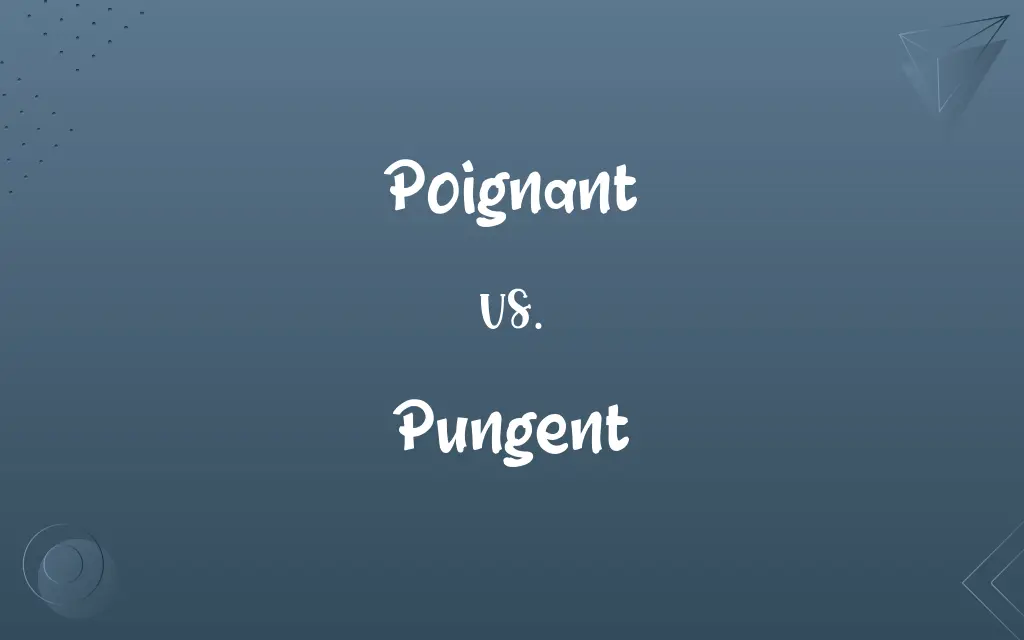Poignant vs. Pungent: Know the Difference

By Dua Fatima & Hifza Nasir || Updated on March 7, 2024
Poignant evokes a keen sense of sadness or regret, focusing on emotional depth; pungent refers to a sharp, strong taste or smell, appealing to the senses.

Key Differences
Poignant is often used to describe experiences or memories that stir deep emotional responses, typically sadness or nostalgia. It captures feelings that touch the heart and provoke thought, like the lingering sorrow from a loss. Pungent, on the other hand, is primarily associated with the physical senses, particularly smell and taste. It describes an intense, often sharp sensation that can be either pleasant or overpowering, like the distinct aroma of garlic.
Hifza Nasir
Mar 07, 2024
While poignant moments are remembered for their emotional impact, affecting one's mood or outlook, pungent sensations are remembered for their physical impact on the senses. For example, a poignant memory might bring tears to one's eyes, whereas a pungent odor might cause one to recoil or sneeze.
Dua Fatima
Mar 07, 2024
Poignant can also imply a sense of beauty or sweetness in sadness, showing how deeply moving experiences can have a positive, transformative effect. Pungent, in contrast, does not typically carry emotional connotations but is more about the strength or intensity of sensory experiences, which can be either appealing or off-putting.
Dua Fatima
Mar 07, 2024
In literature and art, poignant is used to describe scenes, stories, or images that convey profound emotional messages, inviting reflection and empathy. Pungent is used to vividly describe scenes or settings where smell or taste plays a significant role, enhancing the realism or atmosphere of the narrative.
Shumaila Saeed
Mar 07, 2024
While poignant experiences often lead to personal growth or deeper understanding, pungent experiences might simply be memorable for their intensity, without necessarily leading to any emotional or intellectual development. Both, however, enrich the human experience, whether through the heart or the senses.
Hifza Nasir
Mar 07, 2024
ADVERTISEMENT
Comparison Chart
ADVERTISEMENT
Poignant and Pungent Definitions
Poignant
Keenly distressing to the feelings.
Her poignant remarks about her childhood resonated with many.
Dua Fatima
Mar 07, 2024
Pungent
Having a sharply strong taste or smell.
The pungent aroma of spices filled the kitchen.
Dua Fatima
Mar 07, 2024
Poignant
Achingly affecting.
There's a poignant beauty in the simplicity of his words.
Hifza Nasir
Mar 07, 2024
Pungent
Acrid.
The pungent fumes from the chemical spill evacuated the building.
Dua Fatima
Mar 07, 2024
Poignant
Evoking a deep sense of sadness or regret.
The movie's poignant ending left the audience in tears.
Hifza Nasir
Mar 07, 2024
ADVERTISEMENT
Pungent
Intensely flavored or smelling.
The pungent smell of garlic is unmistakable.
Shumaila Saeed
Mar 07, 2024
Poignant
Touching. stirring the emotions deeply.
The poignant letter from the soldier was read at the memorial.
Dua Fatima
Mar 07, 2024
Pungent
Penetrating, biting.
His pungent criticism made her reconsider her decision.
Hifza Nasir
Mar 07, 2024
Poignant
Profoundly moving or touching.
The poignant silence after the performance spoke volumes.
Dua Fatima
Mar 07, 2024
Pungent
Causing a sharp sensation.
The cheese had a pungent flavor that was not to everyone's liking.
Hifza Nasir
Mar 07, 2024
Poignant
Arousing deep emotion, especially pity or sorrow; touching
A poignant memory.
A poignant story.
Dua Fatima
Oct 19, 2023
Poignant
Physically painful
"Keen, poignant agonies seemed to shoot from his neck downward" (Ambrose Bierce).
Dua Fatima
Oct 19, 2023
Pungent
To the point; sharp
Pungent talks during which the major issues were confronted.
Dua Fatima
Oct 19, 2023
Poignant
Agreeably intense or stimulating
"It was a poignant delight to breathe the keen air" (Joseph A. Altsheler).
Dua Fatima
Oct 19, 2023
Pungent
Having a strong odor that stings the nose, said especially of acidic or spicy substances.
I accidentally dropped the bottle of ammonia and after few seconds, a very pungent stench could be detected.
Dua Fatima
Oct 19, 2023
Pungent
Having a strong taste that stings the tongue, said especially of hot (spicy) food, which has a strong and sharp or bitter taste.
Dua Fatima
Oct 19, 2023
Poignant
Neat; eloquent; applicable; relevant.
A poignant reply will garner more credence than hours of blown smoke.
Dua Fatima
Oct 19, 2023
Pungent
Causing a sharp sensation, as of the taste, smell, or feelings; pricking; biting; acrid; as, a pungent spice.
Pungent radish biting infant's tongue.
The pungent grains of titillating dust.
Dua Fatima
Oct 19, 2023
Poignant
Evoking strong mental sensation, to the point of distress; emotionally moving.
Flipping through his high school yearbook evoked many a poignant memory of yesteryear.
Dua Fatima
Oct 19, 2023
Pungent
Sharply painful; penetrating; poignant; severe; caustic; stinging.
With pungent pains on every side.
His pungent pen played its part in rousing the nation.
Dua Fatima
Oct 19, 2023
Pungent
Sharp biting or acrid especially in taste or smell;
Tasting the pungent wood sorrel
Pungent curry
A pungent smell of burning sulfur
Dua Fatima
Oct 19, 2023
Poignant
Fig.: Pointed; keen; satirical.
His wit . . . became more lively and poignant.
Dua Fatima
Oct 19, 2023
Poignant
Arousing affect;
The homecoming of the released hostages was an affecting scene
Poignant grief cannot endure forever
His gratitude was simple and touching
Dua Fatima
Oct 19, 2023
Repeatedly Asked Queries
What does poignant mean?
Poignant refers to something that evokes a deep emotional response, often sadness or nostalgia.
Hifza Nasir
Mar 07, 2024
Can a memory be described as pungent?
Typically, memories are described as poignant when they evoke deep emotions, not pungent.
Dua Fatima
Mar 07, 2024
What makes a scent pungent?
A scent is pungent when it is strong and sharp, often in an intense or overpowering way.
Hifza Nasir
Mar 07, 2024
Can food be poignant?
Food is usually described as pungent when referring to its strong taste or smell, not poignant.
Hifza Nasir
Mar 07, 2024
Can a place smell pungent?
Yes, places can have pungent smells, especially if there are strong odors present.
Hifza Nasir
Mar 07, 2024
How can art be poignant?
Art is poignant when it evokes deep emotional responses, reflecting on human experiences or feelings.
Dua Fatima
Mar 07, 2024
Are poignant experiences positive or negative?
Poignant experiences can be both; they are memorable for their emotional depth, whether sad or bittersweet.
Dua Fatima
Mar 07, 2024
Is nostalgia always poignant?
Nostalgia is often poignant as it evokes longing or sadness for the past, but its emotional impact can vary.
Dua Fatima
Mar 07, 2024
Is poignant used only in negative contexts?
No, poignant can be used in both negative and positive contexts, as long as it evokes deep emotional responses.
Shumaila Saeed
Mar 07, 2024
Is poignant always related to sadness?
While often associated with sadness, poignant can also describe anything that deeply touches or moves one emotionally.
Dua Fatima
Mar 07, 2024
Can humor be pungent?
Yes, humor can be described as pungent when it is sharp, biting, or particularly penetrating.
Dua Fatima
Mar 07, 2024
How can I describe a pungent taste?
A pungent taste is sharply strong, often in a way that is either very flavorful or somewhat overpowering.
Shumaila Saeed
Mar 07, 2024
What's the difference between poignant and sentimental?
Poignant involves deeper, often more complex emotions, while sentimental usually refers to simple, tender emotions without the same depth.
Dua Fatima
Mar 07, 2024
How do poets use poignant imagery?
Poets use poignant imagery to evoke deep emotions, creating vivid, emotionally resonant scenes.
Dua Fatima
Mar 07, 2024
Share this page
Link for your blog / website
HTML
Link to share via messenger
About Author
Written by
Dua FatimaCo-written by
Hifza Nasir







































































